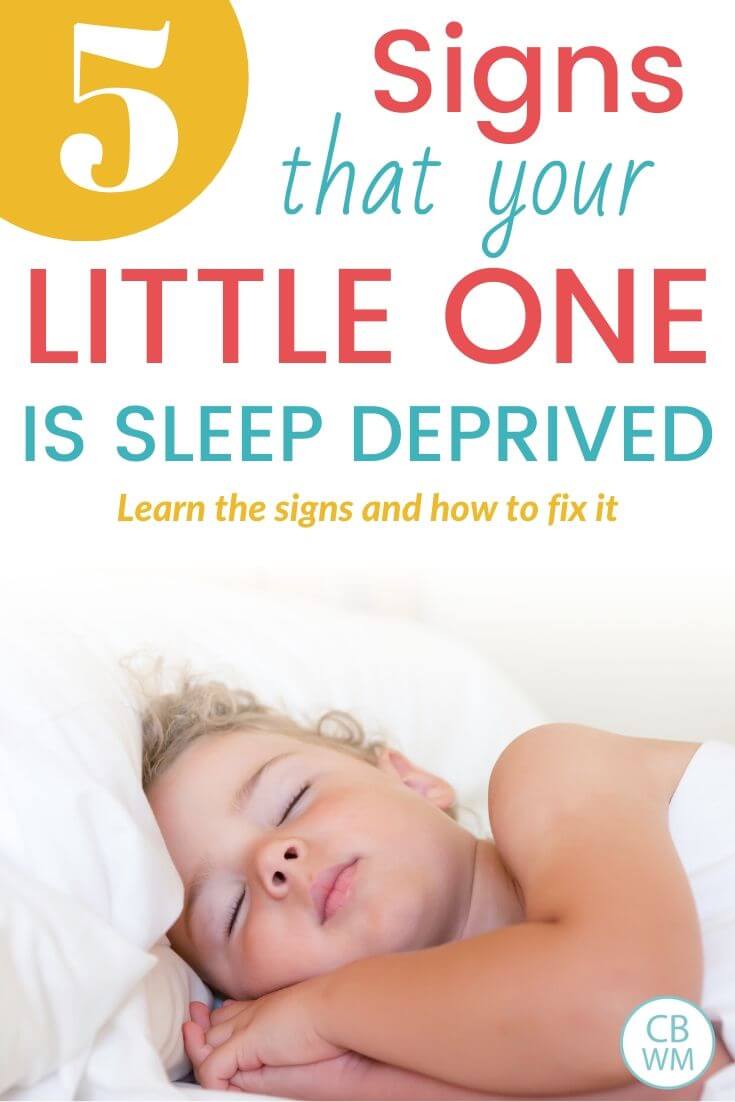If your little one is not sleeping well, it might be due to a sleep deficit, or sleep debt. Learn the signs and how to fix it.

I often talk about a sleep deficit when giving advice for sleeping. You need to understand what a sleep deficit is, what it looks like, why it is a problem, and what to do about it in order to help your little one get great naps and have solid nighttime sleep.
The idea of sleep deficit comes from the book Healthy Sleep Habits, Happy Child written by Marc Weissbluth, M.D.
Post Contents
What is a Sleep Deficit?
A sleep deficit, or a sleep debt, is what happens when your child doesn’t get enough sleep. Basically, it is the difference between the amount of sleep that should be happening and the amount of sleep that is happening. This is often referred to as sleep deprivation.
Sleep deficits grow over time. Just like if you owe money and you are paying interest each month and the amount you owe grows, if your child continually gets less sleep than is ideal, the deficit grows.
When your child isn’t getting enough sleep and the effects add up over time, you have a sleep deficit.
Everyone can have a sleep deficit, even adults. So this is something to be aware of for your baby, toddler, preschooler, tween, teen, and yourself!
A sleep debt is a problem so far as a daily schedule goes, but it is also a medical problem that can lead to health concerns for adults such as diabetes, weight gain, stroke, headaches, memory loss, and irritability, among others.
What happens if there is a sleep deficit?
When your child has a sleep deficit, your child is not getting enough sleep. If the sleep totals stays the same each day (or less), then the deficit will only grow. “…there is a progressive worsening in a child’s mood and performance even when the amount of lost sleep each day or night is constant” (page 116).
This is why when you make a change in sleep, it can take a couple of weeks before you see the negative effects from that sleep change. So you might drop a nap or lengthen a waketime when you shouldn’t have an not know it for a week or two. Things might seem fine at first, and then all of a sudden your little one is not sleeping well anymore.
Any time you have a sleep problem, look at the last couple of weeks and consider what has changed over the last couple of weeks.
“A constant small deficit in sleep produces a cumulative reduction in daytime alertness” (page 116).
If your child is not getting enough sleep, your child will become less alert, more grumpy, more needy, and have a harder time sleeping over time. Remember, sleep begets sleep. Overly tired children have a hard time sleeping.
This can seem illogical. We often think if we keep our child up longer, she will sleep better because she will be more tired. Sleep just doesn’t work that way. As Weissbluth says, it isn’t logical but it is biological (see page 229).
What does sleep deficit mean in real-life application?
A sleep deficit is something to watch out for when sleep changes occur. This is especially true when dropping naps. I see it most often when dropping the morning nap. That transition time is hard, and people sometimes move to just one nap a day sooner than is best for the child and things backfire.
Like Weissbluth says, sleep deficits accumulate over time. You might drop to one nap and have it be great for a few days, then things get a little muddled, and two weeks later you have a 16 month old taking a one hour nap total each day.
If you have recently dropped a nap and your child starts to have napping problems, consider the possibility that your child is not getting enough sleep and a sleep deficit has grown.
>>>Read: Adjusting the Schedule to Fix a Sleep Deficit

Signs Your Child has a Sleep Deficit
Here are some common signs of a sleep deficit:
- Your child wakes up grumpy. “Upon awakening, well-rested children are in good cheer and are able to play by themselves” (page 116). Do note, however, that most newborns wake up crying. It takes several months before you can expect a baby to start waking up happy consistently–probably around 4-6 months old.
- Your child has a hard time falling asleep.
- Your child takes short naps.
- Your child wakes early in the morning.
- Your child’s behavior is worsening. Tantrums are increasing as is disobedience.
Read: Tips to Get Baby Waking Up Happy From Naps
What To Do If Your Child Has a Sleep Debt
When you explain a situation to me and I say I think there is a sleep deficit going on, it means that I think it sounds like your child isn’t getting enough sleep overall and is starting to have a negative impact from the lack of sleep.
To fix the sleep deficit, you need to figure out a way to get your child having more sleep in a 24 hour period. This means you need to figure out why your child isn’t getting the sleep she needs. You might need to add in a nap. You might need to start the nap earlier in the day. You might need to have an earlier bedtime. You might even need more physical exercise and stimulation each day so she is tired enough to sleep when it is time.
Common ways to fix a sleep deficit are:
- Add in a nap
- Lengthen a nap (start earlier or let it go longer)
- Shorten waketime length
- Start bedtime earlier
- Start your day later
- Start your one nap earlier in the day
- Make sure your little one is getting enough exercise and mental stimulation to need to sleep when it is time
Now, you can’t really make up for lost sleep, but you can add in extra sleep until the body feels rested. As your little one recovers from a sleep debt, she might sleep more than she would otherwise. Once her body is caught up enough, she will settle into her new normal.

Conclusion
If your child of any age is behind on sleep and feeling sleep deprived, work to add in a little extra sleep each day over time until he is caught up and able to fall into a natural sleep pattern. Respect the sleep needs of your individual child and do not push sleep milestones sooner than your little one is ready.
Related Posts
- What To Do When Your Pretoddler is Taking a Short Morning Nap
- An Easy Short Nap Fix That Works
- What To Do When Your Baby Wakes Early But Isn’t Hungry
- What To Do When Your Toddler Refuses to Take a Nap
- Common Reasons for Poor Sleep
This post was originally published on this blog in November of 2014

